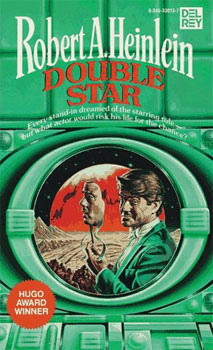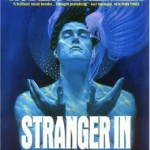It’s election day, so what’s more appropriate this week than a book review on a work of political science fiction? As you by now have guessed, I have a soft spot in my heart for Robert Heinlein, and I thought discussing Double Star today would be more than appropriate. When politics are so on the mind of most Americans as we choose our next president, I thought I would discuss how The Great Lorenzo, a down on his luck actor is whisked off the street and told that he isn’t going to elected to be in politics; he’s going to have to BE one of the major faces of politics. Every actor has a role to play, and Lawrence Smith just got elected for the role of a life time.
When John Joseph Bonforte, head of the Expansionist Coalition, and likely the candidate in an upcoming election, winds up kidnapped, what is their party supposed to do? Certainly not admit he’s been kidnapped or later returned so drugged he barely stands a chance of living. No, here’s what you do when you have a major political opposition leader who has gone missing: you find and train a body double. What you don’t do, however, is tell the actor/double you hired exactly who they are supposed to be impersonating or exactly why until you’ve got them half way to Mars. That’s what Double Star taught me, anyhow.
After the real Bonforte is recovered, Smith is not off of the hook by any means. The ailing politician is far too fragile after being drugged, and it doesn’t look like he’s making a recovery. With the election drawing nearer, Smith cannot give up his charade, but he will have to give up some of his own prejudices. As with all Heinlein’s books there is certainly a political message in this one. Unlike Stranger in a Strange Land or some of his other work, it’s not bogged down with several ideologies and concepts that would really rock the socks off of some conservatives.
One of the central elements of the story revolves around Bonforte’s party platform, mainly should Native Martians have the right to vote in elections that effect the entire solar system? While humans have spread out beyond Earth, they’re up to their old tricks disenfranchising those who are different than themselves. Most of the human population has a physical and mental aversion to the Martians, including The Great Lorenzo, but he must get over his prejudice and not only campaign for their right to vote, but also go through an elaborate Martian ceremony. A ceremony that Bonforte had lots of time to prepare for, but Smith didn’t.
The real Bonforte dies as an after effect of the drugs he had been given while he was kidnapped, but it’s just in time for his healthy doppelganger (and really himself) to get elected. Smith realizes at this point that he cannot go back to merely being an actor, as the part he’s playing is no longer temporary. It cannot be revealed now that Bonforte was kidnapped and essentially murdered because that would not only invalidate his election, but also the ceremony he performed with the Martians, thus undermining the Expansionist Coalitions agenda. This is a role he will have to play for life.
While this isn’t one of Heinlein’s most inspired works, it is a fun and fast read. Lorenzo may be one of the better first person narrators that Heinlein has created, with references back to his family, and a little more depth than he is perhaps used to. It isn’t until Lorenzo totally assimilates himself to Bonforte’s identity that he gets the intelligent and beautiful girl, which is a little different for Heinlein as well. If you like Heinlein, you will like this book. It is not nearly as deep or thought provoking as many of his other works, and really it is more of a character drama and a political drama than a commentary. The one subject he does offer commentary on is race relations. Now I’m more likely to look at my politicians a little closer and wonder, could they really get away with switching in a lookalike, and would it really make a difference?
“There is solemn satisfaction in doing the best you can for eight billion people. Perhaps their lives have no cosmic significance, but they have feelings. They can hurt.”







